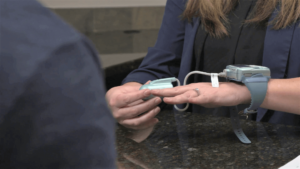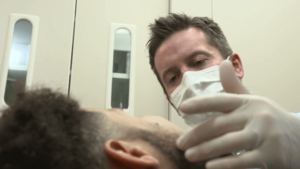TMJ Mouth Guard: A Comprehensive Guide to Choosing the Best Option
AUTHOR

Dr. Joe Magness
Dr. Joe Magness, a sleep-exclusive dentist with 20 years of experience practices at Sleep Utah his Orem, UT Sleep Clinic, where he helps patients suffering from TMJ disorders find relief with a proprietary 3D printed custom mouth guard solution.
Can a Mouth Guard Help With TMJ Disorder Symptoms?
If you're suffering from TMJ disorders, finding relief from the symptoms can be a daunting task. One effective treatment option is using a TMJ mouth guard, but with so many types available, it can be overwhelming to know which one is right for you. That's why we've created this guide to help you decide on the best option for TMJ mouth guards to find relief from your symptoms. We'll discuss the benefits of using a TMJ mouth guard, the different types available, and how to determine which one is the best fit for your specific condition. With this information, you'll be able to make an informed decision and find the relief you need.
What is TMJ? Understanding Temporomandibular Joint Dysfunction
TMJ is a condition that affects the jaw joint and surrounding muscles, and can be caused by various factors such as stress, injury, or teeth grinding. Temporomandibular joint dysfunction (TMJ) can cause a range of symptoms, including jaw pain, headaches, and earaches, which can make it difficult to sleep. Fortunately, a TMJ mouth guard can alleviate these symptoms, improving sleep quality and overall health.
How is TMJ Related to Sleep?
Temporomandibular joint (TMJ) disorders can be caused by a variety of factors, including poor sleep and bruxism (teeth grinding) during sleep. When we sleep, our muscles and joints relax, allowing our body to recover and recharge. However, poor sleep quality, such as not getting enough sleep or experiencing interrupted sleep, can cause muscle tension and fatigue, affecting the muscles used for chewing and leading to TMJ problems.
Teeth Grinding During Sleep
Bruxism can also cause TMJ problems by placing excessive pressure on the jaw joint and muscles, leading to inflammation and pain. In addition, poor sleep quality can also lead to increased stress and anxiety, which can cause clenching or grinding of the teeth during sleep, exacerbating TMJ problems.
Individuals who experience poor sleep and bruxism during sleep should seek treatment to address these underlying issues and prevent potential long-term TMJ problems. It is important to prioritize good sleep hygiene and address any underlying sleep disorders to prevent TMJ problems from developing or worsening.
the Connection between sleep apnea & TMJ Disorders
Sleep apnea and TMJ disorders can be interrelated conditions. Sleep apnea, a sleep disorder characterized by interrupted breathing during sleep, can cause airway obstruction, leading to increased effort to breathe and changes in head and neck posture. This can result in muscle tension and inflammation in the jaw joint and surrounding muscles, leading to TMJ problems. Additionally, sleep apnea can also cause bruxism (teeth grinding or clenching) during sleep, which can further aggravate TMJ problems. Therefore, individuals with sleep apnea may be at an increased risk of developing TMJ disorders, and it is important to address both conditions to improve overall sleep and oral health.
Common Symptoms of TMJ Problems: What to Look Out For
TMJ disorders can cause a range of symptoms that can affect daily life. Here are some common symptoms of TMJ disorders:
- Pain or tenderness in the jaw, face, neck, shoulders, or ears
- Difficulty or discomfort when opening or closing the mouth
- Clicking, popping, or grating sounds when moving the jaw
- Headaches or migraines
- Dizziness or vertigo
- Teeth sensitivity or discomfort while biting or chewing
- Jaw muscle stiffness or spasms
- Bruxism (teeth grinding or clenching)
- Tinnitus (ringing in the ears)
- Vision problems or eye pain
If you are experiencing any of these symptoms, it is important to consult with a healthcare provider or a dentist to determine the underlying cause and receive appropriate treatment.
The Benefits of TMJ Mouthguards
Mouth guards, also known as splints or night guards, can be an effective treatment option for relieving some of the symptoms of TMJ disorders. These custom-fitted devices are worn over the teeth during sleep and work by reducing the pressure and tension on the jaw joint and muscles. Mouth guards can help to:
- Protect the teeth from damage due to bruxism (teeth grinding or clenching)
- Prevent the jaw from clenching or shifting during sleep
- Reduce muscle tension and fatigue in the jaw muscles
- Provide cushioning and support to the jaw joint
Mouth guards are often recommended as a first-line treatment for TMJ disorders, especially if bruxism is a contributing factor. They can be obtained through a dentist or a healthcare provider and are typically designed to be comfortable and easy to wear. However, it is important to consult with a healthcare provider to determine if a mouth guard is the appropriate treatment option for your specific TMJ condition.
Types of Mouth Guards for TMJ
Choosing the Right One for You
There are different types of mouth guards available for TMJ disorders, each designed to address different aspects of the condition. Some common types of mouth guards for TMJ include:
Soft mouth guards:
Made of pliable materials such as silicone or rubber, these mouth guards are designed to cushion the teeth and reduce muscle tension.
Hard acrylic mouth guards:
These rigid mouth guards provide a protective barrier to prevent teeth grinding and alleviate jaw pain.
Dual-laminate mouth guards:
These mouth guards consist of a soft inner layer and a hard outer layer, providing both cushioning and protection to the teeth and jaw.
Mandibular repositioning appliances:
These custom-fitted devices are designed to reposition the lower jaw and reduce pressure on the TMJ, helping to alleviate symptoms of TMJ disorders.
It is important to consult with a healthcare provider or a dentist to determine the appropriate type of mouth guard for your specific TMJ condition.
Custom Oral Appliance vs. OTC Oral Appliance: Which is Best for TMJ?
Over-the-counter (OTC) mouth guards for TMJ
Over-the-counter (OTC) mouth guards for TMJ disorders are readily available in drugstores and online retailers. These mouth guards are pre-fabricated and may not fit every individual's mouth comfortably or effectively. They are typically less expensive than custom-fitted mouth guards but may not provide the same level of protection or relief.
Custom mouth guards
Custom mouthguards, on the other hand, are designed to fit the individual's mouth precisely, providing optimal comfort and protection. These mouth guards are typically made by a dentist or a sleep specialist and are customized to the individual's specific TMJ condition. Custom mouth guards may be more expensive than OTC mouth guards, but they are often a more effective and long-term solution for TMJ disorders. It is important to consult with a healthcare provider or a dentist to determine the appropriate type of mouth guard for your specific TMJ condition.
The Best Mouth Guard for TMJ: Finding the Right Fit
Sleep Utah's Proprietary Ripple Oral Appliance Offers Relief From TMJ Disorder Symptoms
The Ripple Oral Appliance is a custom 3D printed device designed to support proper breathing and ideal jaw position while sleeping. It guides the patient to an ideal jaw position while clenching and grinding teeth, encourages closing the lips for improved nasal breathing, and contacts only in the front for smooth movement and minimized muscle contraction. The appliance protects the health of the jaw, joint muscles, and teeth, while improving sleep quality and overall health by reducing clenching and grinding during sleep.
TMJ Night Guard Cost: How Much Should You Expect to Pay?
The cost of TMJ mouth guards can vary depending on several factors, including the type of mouth guard, the materials used, and the provider. Over-the-counter (OTC) mouth guards can range from $10 to $30, while custom-fitted mouth guards from a dentist or sleep specialist can range from $500 to $3,500 or more. Mandibular repositioning appliances, a type of custom mouth guard, are typically more expensive than other types of mouth guards due to their advanced design.
Does insurance cover TMJ Mouth Guards?
Insurance coverage for TMJ mouth guards may vary depending on the specific plan, and some plans may only cover a portion of the cost. To minimize out-of-pocket expenses, it is advisable to consult with Sleep Utah's experienced team in medical billing, who can utilize medical insurance to cover some or all of the cost. Financing options may also be available for qualifying patients, resulting in low monthly payments often under $100. Ultimately, if you are experiencing TMJ symptoms, it is important to consult with a healthcare provider or a dentist to determine the appropriate treatment options and to discuss any cost concerns or insurance coverage options.
Sleep Utah: A Good Place to Start with Sleep Testing for TMJ
Sleep Utah, a leading provider of dental sleep medicine in Utah, offers a wide range of treatment options for individuals suffering from sleep disorders such as sleep apnea and snoring. The company specializes in custom-fit oral appliances and offers the proprietary Ripple oral appliance, designed to gently reposition the jaw and promote open airways for improved breathing during sleep. Sleep Utah also provides free consultations for individuals seeking treatment, including a CT scan and digital scan of the mouth to determine the most effective treatment plan. With a team of experienced and knowledgeable professionals, Sleep Utah is dedicated to improving the overall health and quality of life of their patients through advanced dental sleep medicine solutions.
Finding Relief for TMJ Problems with a Mouth Guard
In conclusion, a TMJ mouth guard can be an effective treatment option for individuals suffering from TMJ disorders. While there are various types of mouth guards available, it is important to consult with a healthcare provider or a dentist to determine the appropriate type of mouth guard for your specific condition. Custom-fitted mouth guards made by a dentist or sleep specialist can provide the most comfort and protection, but may come with a higher cost. However, insurance coverage and financing options may be available. Regardless of the type of mouth guard chosen, seeking professional help for TMJ symptoms is essential to prevent long-term complications. Don't let TMJ symptoms interfere with your quality of life - consider a TMJ mouth guard as a viable treatment option.


